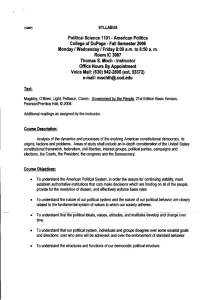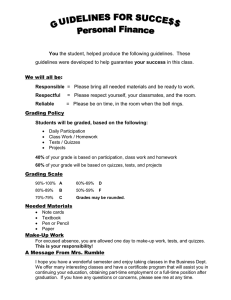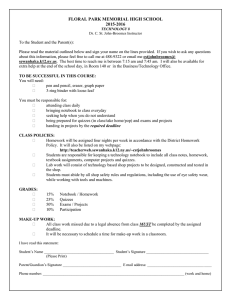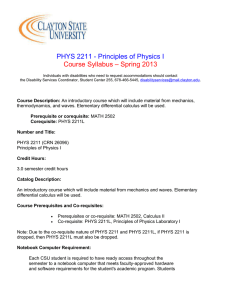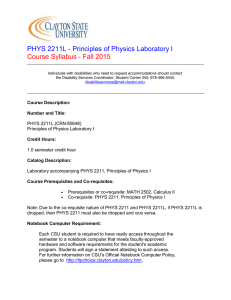PHYS 1111 – Introductory Physics I Course Syllabus
advertisement
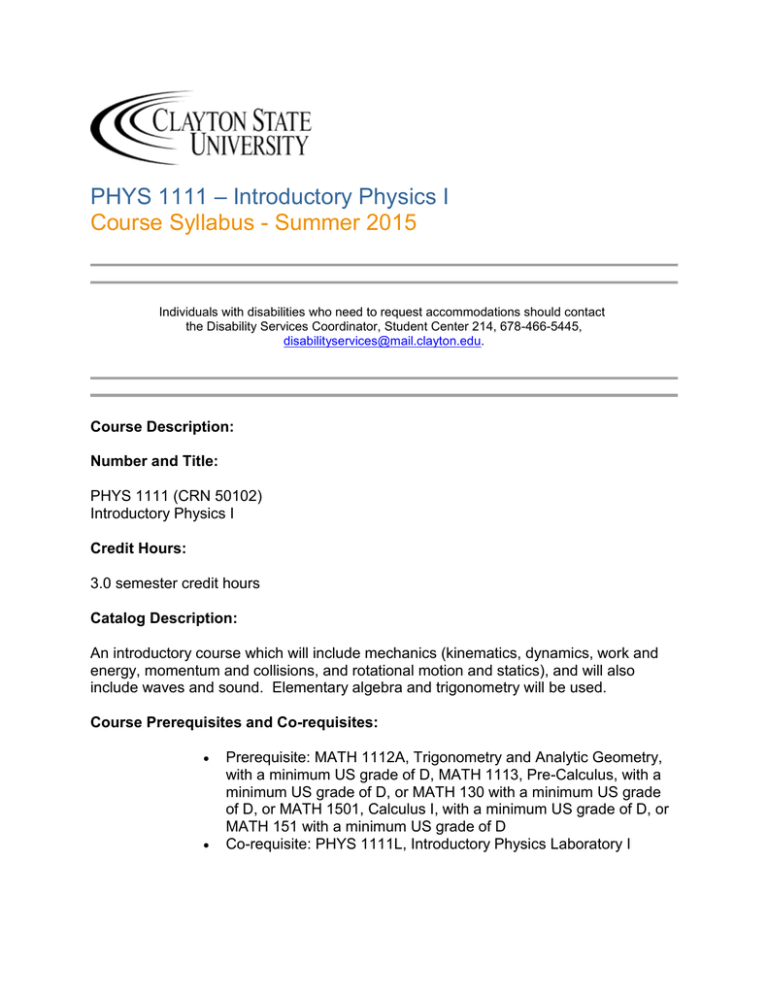
PHYS 1111 – Introductory Physics I Course Syllabus - Summer 2015 Individuals with disabilities who need to request accommodations should contact the Disability Services Coordinator, Student Center 214, 678-466-5445, disabilityservices@mail.clayton.edu. Course Description: Number and Title: PHYS 1111 (CRN 50102) Introductory Physics I Credit Hours: 3.0 semester credit hours Catalog Description: An introductory course which will include mechanics (kinematics, dynamics, work and energy, momentum and collisions, and rotational motion and statics), and will also include waves and sound. Elementary algebra and trigonometry will be used. Course Prerequisites and Co-requisites: Prerequisite: MATH 1112A, Trigonometry and Analytic Geometry, with a minimum US grade of D, MATH 1113, Pre-Calculus, with a minimum US grade of D, or MATH 130 with a minimum US grade of D, or MATH 1501, Calculus I, with a minimum US grade of D, or MATH 151 with a minimum US grade of D Co-requisite: PHYS 1111L, Introductory Physics Laboratory I Note: Due to the co-requisite nature of PHYS 1111 and PHYS 1111L, students dropping one of the two courses must also drop the other. Computer Requirement: Each CSU student is required to have ready access throughout the semester to a notebook computer that meets faculty-approved hardware and software requirements for the student's academic program. Students will sign a statement attesting to such access. For further information on CSU's Official Notebook Computer Policy, please go to Computer Policy. Computer Skill Prerequisites: Able to use the WindowsTM operating system Able to use Microsoft WordTM word processing Able to send and receive e-mail using OutlookTM or Outlook ExpressTM Able to attach and retrieve attached files via email Able to use a Web browser. In-class Use of Student Notebook Computers: Student notebook computers will not be used in the classroom in this course. Computers will be required to access course materials and to communicate with your instructor. Course Objectives: To learn the basic laws of classical mechanics and wave motion. To apply the basic laws of physics to the solution of conceptual and quantitative problems. To further develop the ability to solve problems through logical thought and organized reason. Student Learning Outcomes: General education outcomes: The following link provides descriptions of the communications outcome and the critical thinking outcome components: Clayton State University Core Curriculum Outcomes PHYS 1111 supports outcomes 3 and 4 of the biology major: Outcome 3. Apply knowledge of physical sciences, mathematics, and statistics to biological concepts. Outcome 4. Communicate scientific information in a clear and concise manner both orally and in writing. Teacher education outcomes: The content of this course syllabus correlates to education standards established by national and state education governing agencies, accrediting agencies and learned society/professional education associations. Please refer to the course correlation matrices located at the following site: Professional Standards and Program Outcomes Term: Summer 2015 Instructor Information: Instructor Mr. Harold Banke phone: (678) 466-4770 e-mail: haroldbanke@clayton.edu internet: http://faculty.clayton.edu/hbanke/Home Class Meetings: TR: 10:30 am – 12:50 pm. University Center: U267 Office Office Hours Faculty MW: 10:00-10:30 am; Hall 1:30-2:30 pm Room TR: 9:45 -10:30 am; 3:30 – 130 4:00 pm Textbook Information: Serway/Vuille, College Physics, 10th edition, Thomson, 2014. Text Coverage: Chapters 1 - 8, 13-14 Online Reference Textbook: http://cnx.org/contents/031da8d3-b525-429c-80cf-6c8ed997733a/College_Physics Evaluation: In-class examinations: 2 exams 60 % Homework and Quizzes (8 highest quizzes) 20 % Final examination** 20 % TOTAL 100 % **The final examination will be comprehensive. Grading: A 90 - 100% B 80 - 89% C 70 - 79% D 60 - 69% F below 60% Mid-term Progress Report The mid-term grade in this course, which will be issued before June 24, reflects approximately 30% of the entire course grade. Based on this grade, students may choose to withdraw from the course and receive a grade of "W." Students pursuing this option must fill out an official withdrawal form, available in the Office of the Registrar, by mid-term, which occurs on June 25, 2015. Course Schedule: The schedule of lesson topics is provided in the separate course schedule which also provides links to objectives and homework assignments. Course Policies: General Policy: Students must abide by policies in the Student Handbook, and the Basic Undergraduate Student Responsibilities. University Attendance Policy Students are expected to attend and participate in every class meeting. Instructors establish specific policies relating to absences in their courses and communicate these policies to the students through the course syllabi. Individual instructors, based upon the nature of the course, determine what effect excused and unexcused absences have in determining grades and upon students’ ability to remain enrolled in their courses. The university reserves the right to determine that excessive absences, whether justified or not, are sufficient cause for institutional withdrawals or failing grades. Course Attendance Policy Attendance is expected for all class periods. Attendance is required for quiz and examination periods. Any absence must be accompanied by a written excuse from a doctor or other competent authority. Missed Work Without a valid excuse, a grade of zero points may be assigned for the missed work. If a valid excuse is provided: Make-up quizzes will be given only if they are taken before the next class period. If the make-up quiz cannot be taken before the next class period, the missed quiz will be counted as a quiz which can be dropped. Make-up examinations will be given only if they are taken before graded examinations are returned to students (next class period). In the event that a make-up examination cannot be taken before exams are returned to other students, the final exam grade will take the place of one missed exam grade in calculating the course grade. The final examination must be taken. Academic Dishonesty Any type of activity that is considered dishonest by reasonable standards may constitute academic misconduct. The most common forms of academic misconduct are cheating and plagiarism. All instances of academic dishonesty will result in a grade of zero for the work involved. All instances of academic dishonesty will be reported to the Office of Student Life/Judicial Affairs. Judicial procedures are described at Judicial Procedures Other Policies The use of simple calculators is allowed for all quizzes and examinations. All examinations are closed book. No student-produced "memory sheets" or note cards are allowed. An instructor-produced reference data pamphlet may be provided for some quizzes and examinations. No smoking, eating or drinking is permitted at any time in the classroom. Important dates: Quizzes: Quizzes will be announced in advance. Exams: See Course Schedule. Last day to withdraw without academic penalty: Thursday, June 25, 2015. Last update:
